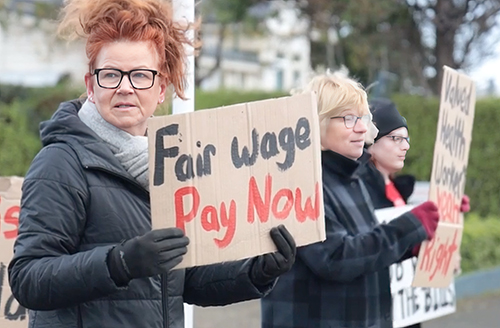Strike may delay critical blood testing and cause postponement of many surgical procedures
Medical technicians, phlebotomists, and clinical laboratory scientists in New Zealand are once again going on strike for fairer pay in various areas around the island nation. And their complaints mirror similar complaints by healthcare and clinical laboratory workers in the US.
The latest group of New Zealand medical laboratory workers to strike are in the South Island and Wellington regions. They were scheduled to walk off the job on July 28 after a negotiated agreement was not reached between APEX, a “specialist union representing over 4,000 allied, scientific, and technical health professionals,” according to the union’s website, and Awanui Labs, one of the country’s largest hospital and clinical laboratory services providers.
Medical laboratory workers in New Zealand are among some of the poorest paid healthcare professionals in the country’s medical industry, according to New Zealand Institute of Medical Laboratory Science President Terry Taylor who told the New Zealand Doctor that some workers aren’t making a living wage. “These people worked their butts off during the pandemic, so you’d think [Awanui] would be able to come up with a decent offer for its staff,” Taylor said.

On the picket line, New Zealand phlebotomists and medical laboratory technicians express that they do not feel they are being compensated properly. “Without your blood samples, you don’t get your results, you don’t get your treatments, you don’t get admissions, your hospital appointments, your operations,” a phlebotomist told 1News. Clinical laboratory workers in the US who experienced the enormous pressure during the COVID-19 lockdowns would likely agree. (Photo copyright: Otago Daily Times.)
Phlebotomists and lab workers in an around New Zealand are demanding a pay wage to put them on par with healthcare workers in the public sector. According to The Southland Times this raise would average around 23.5%.
However, to date Awanui has only offered the medical laboratory workers a 5% pay increase. The APEX union says that is far below what is acceptable for them.
“It doesn’t even get them to parity with colleagues from the public hospitals, and with inflation the way it is at the moment, it’s effectively a wage cut. So, it looks like these strikes are continuing,” David Munroe, Apex Union Advocacy Lead, told 1News New Zealand.
Patients in these regions can expect to see delays on blood test results as medical laboratories and phlebotomy collection centers close due to the strike action.
Poorest Paid Health Professionals in New Zealand
Last year, Dark Daily reported on a similar strike of New Zealand’s 10,000 healthcare workers—including its 4,000 medical laboratory scientists and technicians—which was scheduled to take place in March.
In “Four Thousand New Zealand Medical Laboratory Scientists and Technicians Threatened to Strike over Low Pay and Poor Working Conditions,” we covered how a last-minute court injunction stopped the mass walkout just 24 hours before it was to begin because of a rise in COVID-19-related hospitalizations.
That strike was also over low pay and poor working conditions.
This year, unionized workers met with Awanui on May 23, but the company declined to make an offer to prevent the strike. A second day of bargaining was scheduled for May 24, but according to Munroe, Awanui refused to show up for negotiations. However, Vicki McKnight, an Awanui General Manager, claimed the company was willing to come to the table but that “APEX declined,” New Zealand Doctor reported.
“To date, there has only been one day of bargaining and the collective agreement has not yet expired, so we are surprised by the comments on potential industrial action after just one day of negotiations,” McKnight told New Zealand Doctor.
McKnight said the parties were unable to come to an agreement because of a significant gap between the claims the parties brought to the bargaining table.
Awanui Pays Out Dividends in the Millions
In reaction to workers taking to the picket line, Awanui Labs acknowledged the strike. The company’s Chief People Officer Emma Kelly told 1News, “We do value our people, and it’s a difficult position to be in strikes for our people, for our patients, for everyone. So, I just want to go into this situation with empathy and respect for all of those involved.”
However, one of the things the New Zealand clinical laboratory workers took particular issue with, in light of Awanui’s 5% offer, was that in the last financial year Awanui paid out $41 million in dividends to its shareholders. According to Munroe, the workers want the company to invest in them—instead of the shareholders.
“They are the business. You can’t run laboratories without scientists, technicians, and phlebotomists. They know it, and it’s about time the company knows it too,” Munroe told 1News.
The medical laboratory workers plan to remain on the picket line until a deal is made.
Clinical laboratory managers in the US should take heed of what the New Zealand strikers are saying about low pay and poor working conditions—situations mirrored in many nations following the COVID-19 pandemic.
—Ashley Croce
Related Information:
Blood Test Delays on the Way as Workers Prepare to Strike
Lab Workers Gearing Up for Second Full Strike
Awanui Laboratory Workers to Strike Over Pay Offer
Country’s Biggest Medical Lab Provider Facing Strike Action
‘Can’t Live on These Wages’: Lab Workers Begin Strike Action


